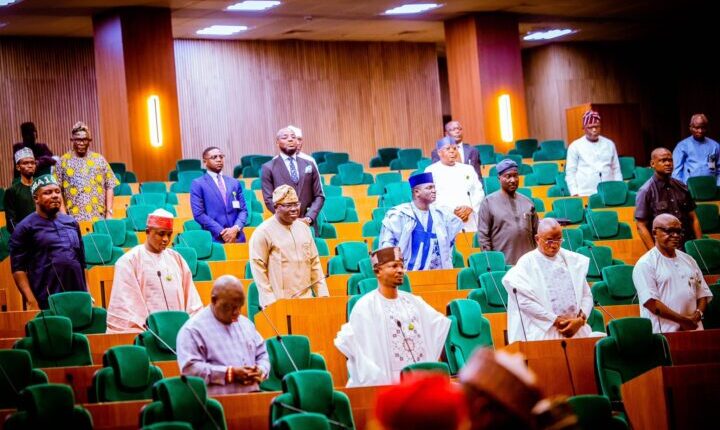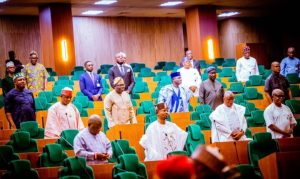
TELCOS TARIFF HIKE: REPS DEMAND REVERSAL AS NEW RATES KICK IN

A senior official at Globacom, who was not authorised to speak on the matter, confirmed that while the company had not yet rolled out the new tariffs, there was a possibility of an update before the close of business on Tuesday.
An executive at Airtel, who also spoke under the condition of anonymity, indicated that the tariff hike had been implemented across the industry.
“As far as I know, every operator has commenced. This is an industry-wide decision, not an operator decision. Our prices have never been uniform, and the decision was made collectively on Monday. Every operator must have begun, even if the rollout is not yet fully completed,” the executive told newsmen.
The House of Representatives intervention came after a motion of urgent public importance was raised by a member of the Peoples Democratic Party from Bayelsa State, Oboku Oforji during Tuesday’s plenary session.
The motion, titled “Need for the Nigerian Communications Commission not to approve the impending hike in the telecommunications tariffs,” sought to halt the tariff increase.
Oforji argued that while telecommunications companies justified the tariff hike by citing rising operational costs and the need for improved service delivery, the timing was particularly problematic given the economic hardship many Nigerians face.
He noted that inflation, which hit a record 34.6 per cent in November 2024, and the removal of fuel subsidies had already placed significant financial strain on citizens.
“The House is aware that telecom operators have been advocating for this hike for over eleven years,” Oforji said.
“However, the National Association of Telecoms Subscribers has rejected the proposed increase, describing it as insensitive and a further burden on consumers who are already grappling with economic challenges and poor network service delivery.”
Oforji emphasised that the telcos must first address long-standing issues related to poor network service before implementing a price increase. He warned that the tariff hike would only exacerbate financial struggles for many Nigerians, deepening poverty and widening inequalities.
“Affordable connectivity is a must for progress in critical sectors like digital banking, education, healthcare, agriculture and e-governance,” stressing that “informal sector workers who depend on affordable mobile data to access gig work opportunities may find it harder to stay connected.”
He further argued that small businesses “which rely heavily on affordable telecommunication for operations, marketing, and customer engagement, will face additional financial burden.”
Oforji said, “It is estimated that a 10 per cent increase in telecommunications costs would reduce small business profitability up to 7 per cent, potentially leading to the closure of businesses.”
Another lawmaker from Edo State, Billy Osawaru, called on the service providers to first improve the quality of their services before coming up with a hike in tariff.
“Why is it that when things go wrong in this country, the poor people must suffer? First, it was the electricity tariff, now it is the turn of the telecom companies. Nigerians must enjoy these services.
“In the developed world, people are not used to carrying two mobile phones but this is the practice here. The thinking is if there is no service in one, you might be lucky with the other one. I believe that this increase in tariff should wait until services improve,” he said.
Industry stakeholders, particularly the Association of Licensed Telecommunications Operators of Nigeria, have defended the tariff increase, arguing that it is vital for the long-term sustainability of the sector.
The Chairman of ALTON, Gbenga Adebayo highlighted that sustained underinvestment in the telecommunications sector could lead to an irreparable decline in services.
“I understand that a price review is necessary for the survival of the telecom sector,” Adebayo said on a call. “None of us can afford to see this sector collapse.
The inability to recover investments in the telecom industry has made sustainability increasingly difficult. When there is prolonged underinvestment, it becomes virtually impossible to recover.”
While acknowledging the public’s concerns about inflation and the high cost of data, Adebayo stressed that the tariff hike was driven by the urgent need to keep the industry afloat.
He expressed confidence that lawmakers, after fully assessing the situation, would come to understand the necessity of the adjustment.
“The public’s concerns are valid, but this tariff increase is essential for sustaining the sector,” he said.
The NCC announced the tariff hike on January 20, citing rising operational costs and the need to ensure the long-term sustainability of the telecommunications sector.
The commission, through its Director of Public Affairs, Reuben Muoka, underscored that the decision aligns with its regulatory mandate under Section 108 of the Nigerian Communications Act, 2003.
However, the National Association of Telecommunications Subscribers voiced its opposition, threatening legal action against the approved tariff increase. NATCOMS argued that the hike be reversed to 10 per cent.
The Nigeria Labour Congress had also kicked against the increase, calling for the hike to be reversed to five per cent. The union led by its President, Joseph Ajaero threatened a protest on February 4, 2025, which eventually did not hold due to several interventions.
![]()
